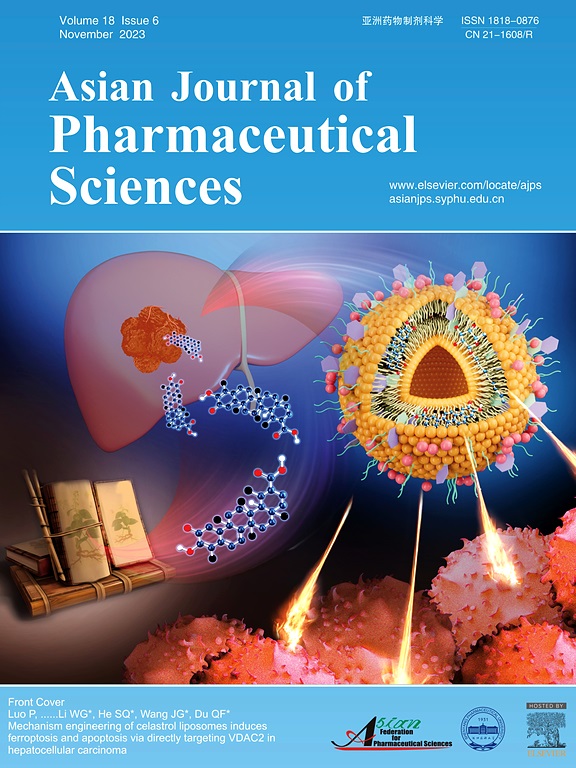IL-2-loaded liposomes modified with sorafenib derivative exert a synergistic anti-melanoma effect via improving tumor immune microenvironment and enhancing antiangiogenic activity
IF 10.7
1区 医学
Q1 PHARMACOLOGY & PHARMACY
引用次数: 0
Abstract
Immunotherapy with interleukin-2 (IL-2) in treating cancers is subject to several limitations such as systemic side effects and reduced efficacy against tumors with low immune cell infiltration despite its promise. To address these challenges, IL-2-So-Lipo, a novel liposomal formulation combining IL-2 with sorafenib derivative, was developed as an anti-angiogenic drug that inhibits the growth of new blood vessels which play crucial roles in tumor growth. Sorafenib derivatives could target at melanoma-specific receptors, further enhancing liposomal specificity at the tumor site. Our results demonstrated that the prepared IL-2-So-Lipo significantly enhanced anti-tumor activity compared to IL-2 or sorafenib monotherapies, as well as their combination. In a B16F10 melanoma model, IL-2-So-Lipo was found to significantly inhibit tumor progression (tumor volume of 108.01 ± 62.99 mm3) compared to the control group (tumor volume of 1,397.13 ± 75.55 mm3), improving the therapeutic efficacy. This enhanced efficacy is attributed to the targeted delivery of IL-2 which promoted the infiltration and activation of cytotoxic T lymphocytes. Additionally, liposomal encapsulation of sorafenib derivatives enhanced its delivery efficiency, promoting tumor cell apoptosis and suppressing angiogenesis. Mechanistically, IL-2-So-Lipo could kill tumors by inducing a shift towards an anti-tumor immune response via facilitating the polarization of macrophages towards the M1 phenotype. Furthermore, IL-2-So-Lipo downregulated several key proteins in the MAPK signaling pathway, exerting a significant role in mediating tumor resistance to sorafenib. These findings underscore the potential of IL-2-So-Lipo as a promising strategy to improve the therapeutic efficacy of immunotherapy and targeted therapy in cancers. Moreover, the combination of IL-2 and sorafenib in a liposomal delivery system overcame the limitations of conventional IL-2 therapy, offering a synergistic approach to improve therapeutic outcomes for solid tumors.

sorafenib衍生物修饰的il -2负载脂质体通过改善肿瘤免疫微环境和增强抗血管生成活性发挥协同抗黑色素瘤作用
白细胞介素-2 (IL-2)在治疗癌症中的免疫疗法受到一些限制,如全身副作用和对低免疫细胞浸润的肿瘤的疗效降低,尽管它很有希望。为了解决这些挑战,IL-2- so - lipo是一种新型的脂质体制剂,将IL-2与索拉非尼衍生物结合,作为一种抗血管生成药物,抑制新血管的生长,而新血管在肿瘤生长中起着至关重要的作用。索拉非尼衍生物可以靶向黑色素瘤特异性受体,进一步增强肿瘤部位脂质体的特异性。我们的研究结果表明,与IL-2或索拉非尼单药及其联合治疗相比,制备的IL-2- so - lipo的抗肿瘤活性显著增强。在B16F10黑色素瘤模型中,IL-2-So-Lipo明显抑制肿瘤进展(肿瘤体积为108.01±62.99 mm3),而对照组(肿瘤体积为1379.13±75.55 mm3),提高了治疗效果。这种增强的功效归因于靶向递送IL-2,促进细胞毒性T淋巴细胞的浸润和活化。此外,索拉非尼衍生物脂质体包封可提高其递送效率,促进肿瘤细胞凋亡,抑制血管生成。在机制上,IL-2-So-Lipo可以通过促进巨噬细胞向M1表型极化,诱导向抗肿瘤免疫反应的转变来杀死肿瘤。此外,IL-2-So-Lipo下调MAPK信号通路中的几个关键蛋白,在介导肿瘤对索拉非尼的耐药中发挥重要作用。这些发现强调了IL-2-So-Lipo作为提高癌症免疫治疗和靶向治疗疗效的有希望的策略的潜力。此外,IL-2和索拉非尼在脂质体递送系统中的联合使用克服了传统IL-2治疗的局限性,为改善实体瘤的治疗结果提供了一种协同方法。
本文章由计算机程序翻译,如有差异,请以英文原文为准。
求助全文
约1分钟内获得全文
求助全文
来源期刊

Asian Journal of Pharmaceutical Sciences
Pharmacology, Toxicology and Pharmaceutics-Pharmaceutical Science
CiteScore
18.30
自引率
2.90%
发文量
11
审稿时长
14 days
期刊介绍:
The Asian Journal of Pharmaceutical Sciences (AJPS) serves as the official journal of the Asian Federation for Pharmaceutical Sciences (AFPS). Recognized by the Science Citation Index Expanded (SCIE), AJPS offers a platform for the reporting of advancements, production methodologies, technologies, initiatives, and the practical application of scientific knowledge in the field of pharmaceutics. The journal covers a wide range of topics including but not limited to controlled drug release systems, drug targeting, physical pharmacy, pharmacodynamics, pharmacokinetics, pharmacogenomics, biopharmaceutics, drug and prodrug design, pharmaceutical analysis, drug stability, quality control, pharmaceutical engineering, and material sciences.
 求助内容:
求助内容: 应助结果提醒方式:
应助结果提醒方式:


